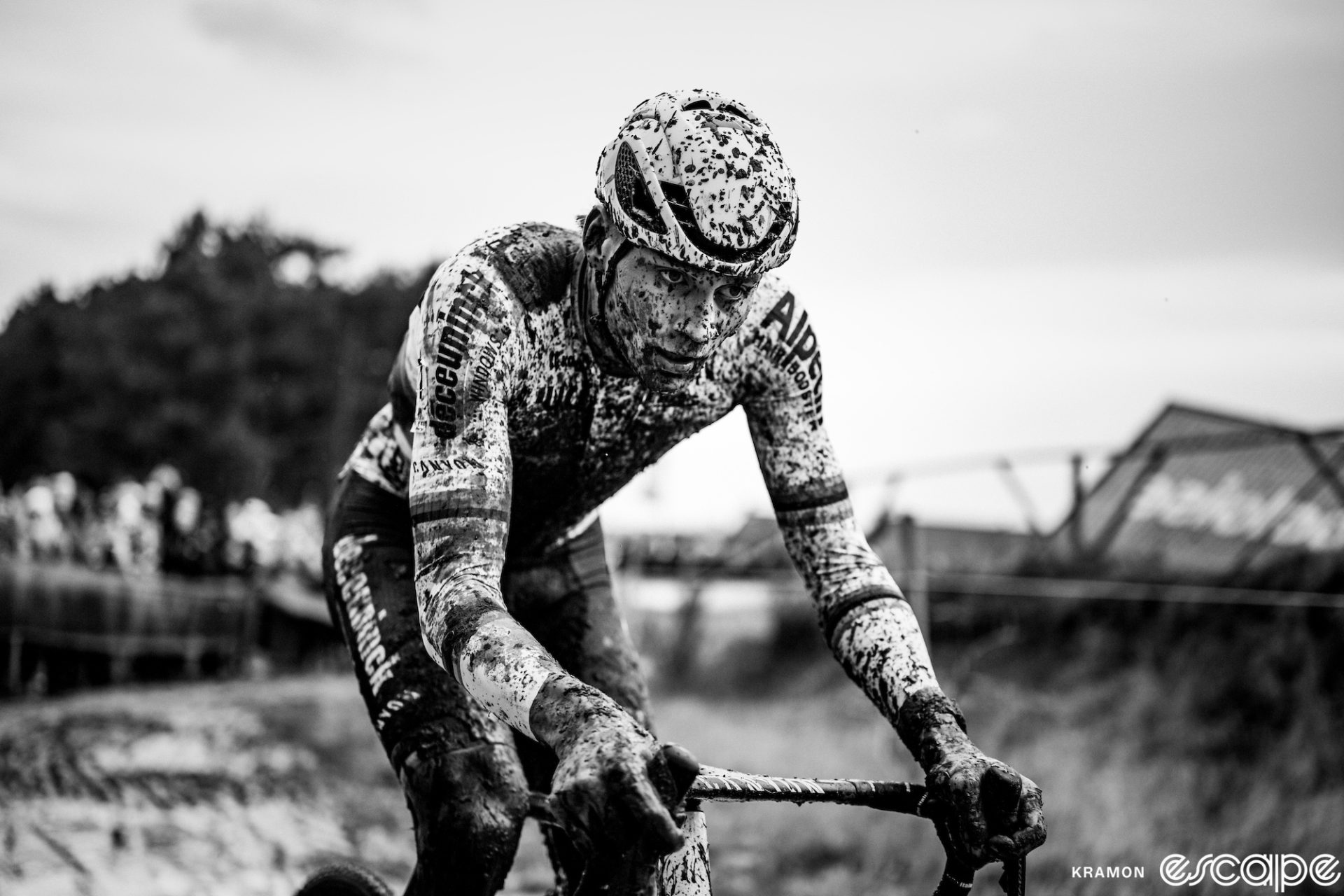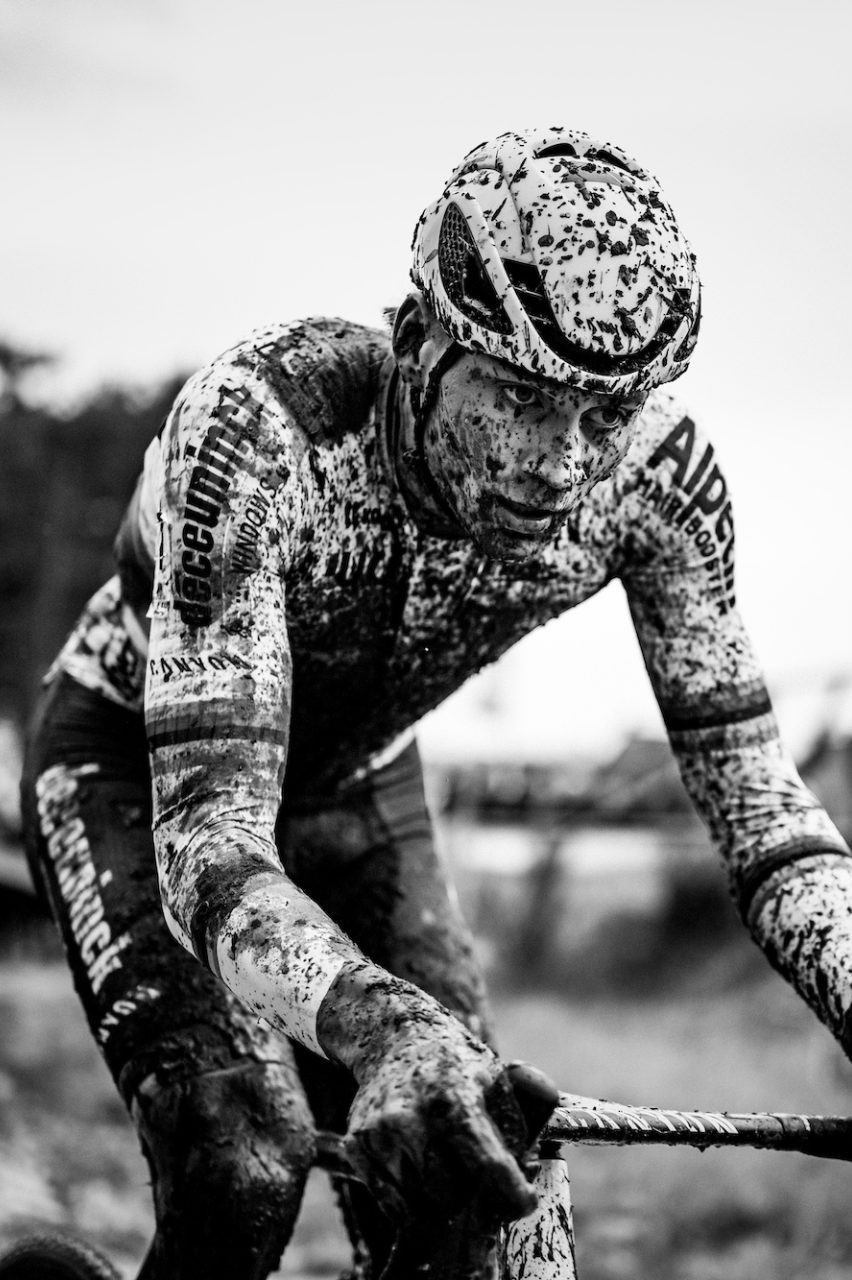Mathieu van der Poel’s first World Cup of the 2023-2024 cyclocross season, in Antwerp, could have started better. Could’ve been worse, of course, but a slipped pedal and then a delay behind Tom Pidcock’s crash left him mired in the last 10 or so riders less than a minute in: decidedly not ideal.
Not that it mattered. By the end of lap one he’d moved up some 20 spots to 15th, to second place by the end of the second, and at the close of the third lap he was in the lead with a 15-second gap. In quick succession, he posted three of the five fastest laps on the day to pull nearly 45 seconds clear of the chase just halfway through the race. Barring a bad crash or major mechanical, the race was over with 30 minutes yet to go.
Many fans had looked forward to the December debuts of Van der Poel and rivals Wout van Aert and Tom Pidcock, yet here on December 23 already the first battle of the sport’s “Big 3” was reduced to a headline billing of Van der Poel and the Achtervolgers, an act that would repeat multiple times over the Kerstperiode holiday races. Van der Poel would launch clear early in the race, build a comfortable gap, and then cruise home the final few laps.
One way to look at this is that Van der Poel’s transcendant talent sucks all the suspense out of the sport and renders it a joyless slog as we’re forced to focus on the battle for the other podium placings to find any sporting suspense. That’s a fair reading, and I don’t fault fans for grumbling about it.
But there’s another perspective that I find more compelling: Van der Poel is a transcendant talent, and we should appreciate his performances because when you zoom out you see how exceptional they are.
It’s worth underlining how rare an athlete of Van der Poel’s talents is. We’re fortunate right now that pro cycling has a number of superstars, including both Vans. But Marianne Vos aside, you have to go outside of cycling to find athletes who are his peer. (Interestingly, his contemporaries in that frame are mostly women: Mikaela Shiffrin, Simone Biles, and Katie Ledecky are the three that come to mind.)
Van der Poel came to road racing relatively late; although 28 years old he’s raced only five full seasons on the road and didn’t even do his first Grand Tour until 2021. Among his 46 road wins are four victories in three different Monuments, a World Road Championship, the Amstel Gold Race, and a stage each of the Tour de France and Giro d’Italia.
But it’s cyclocross where he truly stands among the herd of GOATs I mentioned just above. And yes, I think you can make an argument for Van der Poel as the best men’s cyclocross racer of all time.
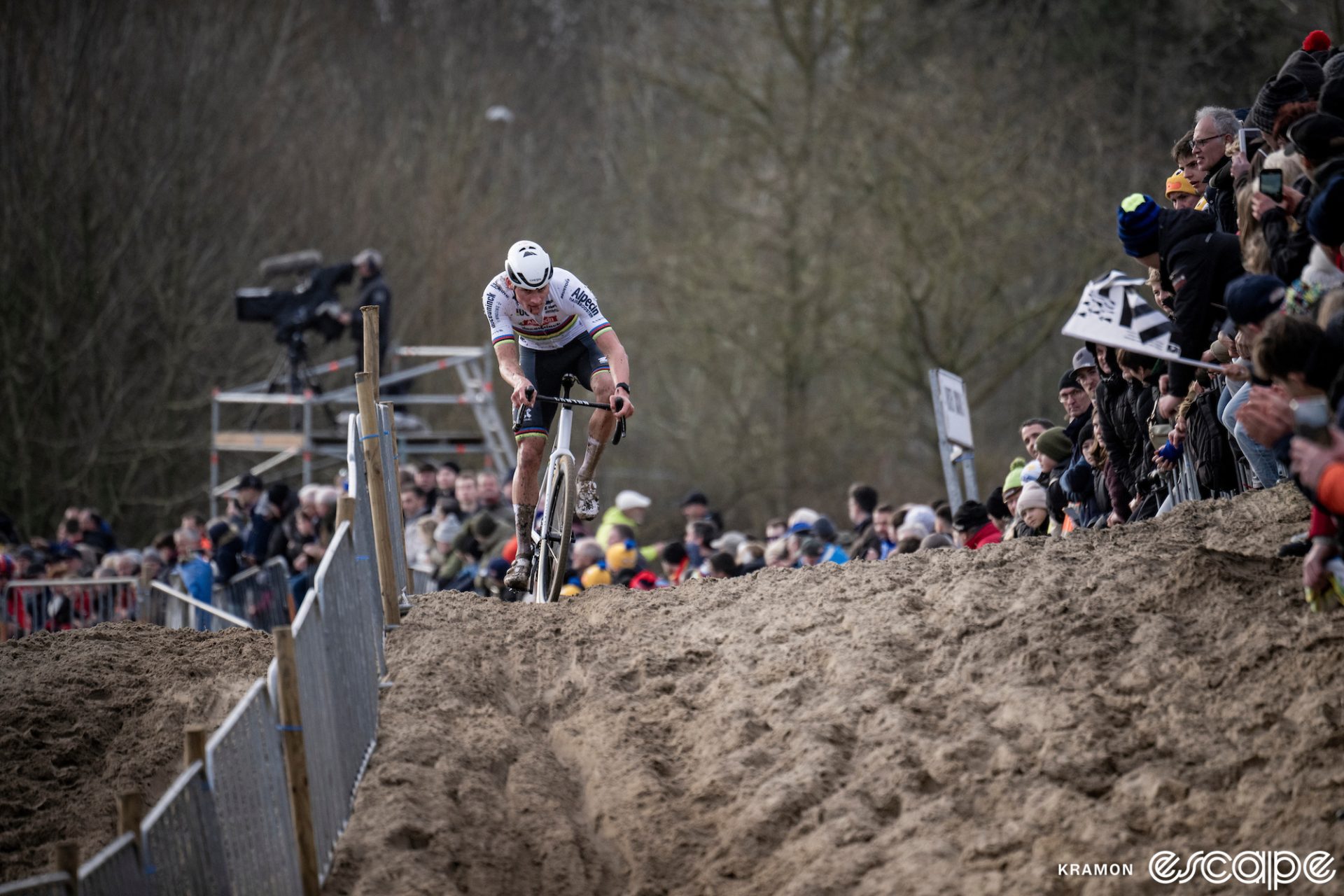
Entering this weekend, he has 158 elite-level wins, which is impressive on its own, but consider the context: Since that first 2014-2015 season, he’s done 215 elite races, for a win rate of 73 percent, and has podiumed in a stunning 89 percent of his starts. In a stat that will give bookies heartburn, he is literally more than six times as likely to win a race as he is to finish fourth or lower. Only one male or female racer in history – Eric De Vlaeminck – has that kind of strike rate (eerily just three tenths of a percent better than Van der Poel’s), and Van der Poel, who is now in range of De Vlaeminck’s seven World titles, is as commanding now as he’s ever been.
What explains that kind of dominance? The obvious answer is a rare combination of power and technical skill, but even looking at Van der Poel’s peers doesn’t neatly explain it. All-time alpine skiing World Cup wins leader Mikaela Shiffrin (35 percent win rate), for instance, is renowned for her technical mastery. While she’s won in every discipline, it’s no surprise that her dominance is strongest in slalom, where a turn initiated just centimeters late can cost the few hundredths of a second that makes the difference between first and second.
Swimming is also a sport where technical skill trumps pure power, but it’s Katie Ledecky’s exquisite consistency that is so singular; her 11-year win streak (not a typo) in the 400-meter freestyle finally ended in December. And Simone Biles’ signature is her ability to push the boundaries of the possible in gymnastics, landing moves in competition that other gymnasts only attempt in practice, if at all. Five of them are named for her.
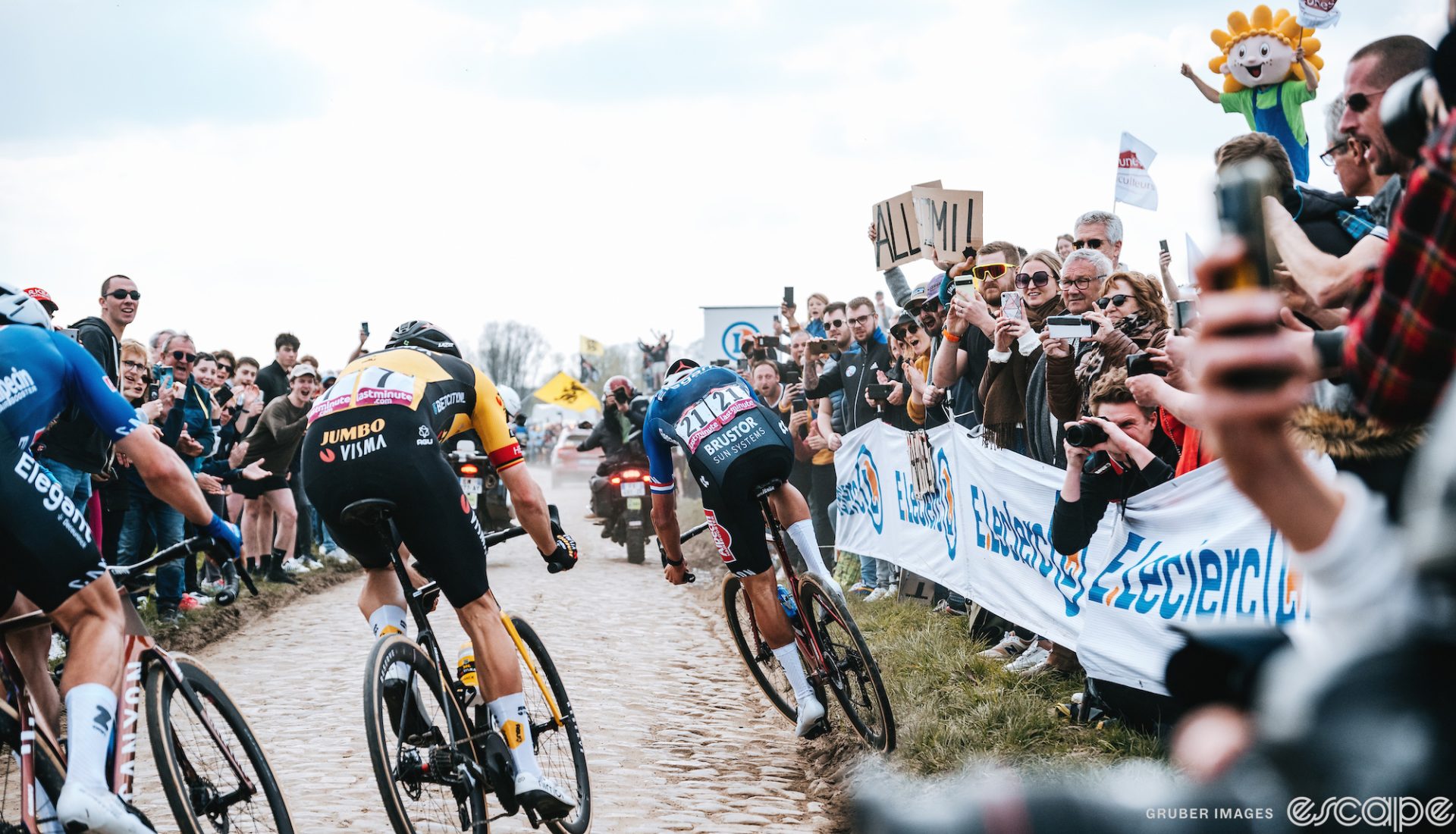
Van der Poel is different: highly skilled technically, of course, but not to a degree that separates him from top-level competition a la Shiffrin or Biles. And he is certainly among the most powerful riders in the world, but competes in a sport where the “playing field” is far more variable than the carefully controlled environment of the pool where Ledecky has racked up wins with metronomic regularity.
Thanks in part to specialization, no one in road racing will likely ever again approach anywhere near Eddy Merckx’s 35 percent win rate. And tactics plays a far larger role in road racing than other sports, or even cyclocross. But Van der Poel races in a highly similar way across disciplines, and I think his cyclocross background is a formative influence on his own style of dominance, which might best be described as raw ferocity: physically, tactically, and temperamentally.
From almost his first elite CX races, Van der Poel has been a class above most of the rest, and that shaped his development as a competitor. When you’re as strong as Van der Poel, tactics aren’t always necessary, and so for a long time he seemed to pay them little attention, even when he began racing WorldTour events.
Remember the 2019 Amstel Gold Race? It was Van der Poel’s first “full” road season, and he almost singlehandedly powered the furious chase that overhauled Jakob Fuglsang and Julian Alaphilippe when the leading pair opted to cat-and-mouse the final few kilometers. With the catch in hand at 400 meters to go, Van der Poel looked back to see if anyone would pull through and, finding no takers, simply opened his own sprint from way too far out without worrying who was on his wheel.
That’s what I mean by raw ferocity. On the road or in ‘cross, Van der Poel races with an abandon, an almost reckless disregard for consequence or even sometimes his own body. He takes lines no one else does, bouncing off course barriers and other riders, like Biniam Girmay in this year’s Tour. In running sections of cyclocross races he flings his bike around as if irritated it’s holding him back. His attacks are marked by a hungry, almost impatient aggression, as he tears at the handlebar and pedals like a predator on fresh meat.
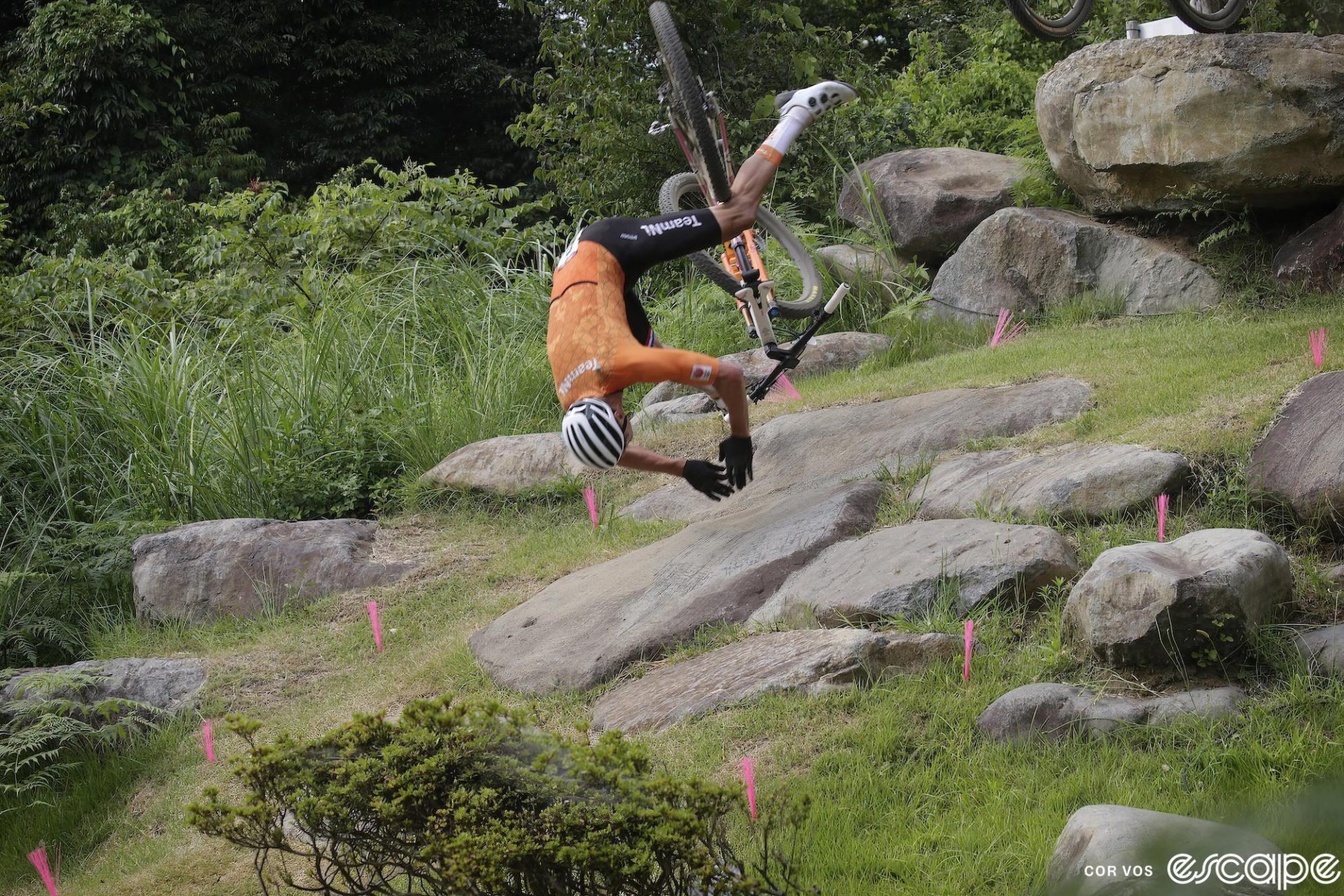
As often as not, that rawness seems a liability as much as strength, and Van der Poel has been prone to some spectacular self-inflicted defeats. It was 2019, after all, when a surefire shot at a World Road Championship vanished when over the course of a few kilometers a hunger-knocked Van der Poel went from powering the break to pedaling squares on a brutally soaked, cold day with the finish almost in sight.
And who can forget the mental lapse of the Tokyo Olympics cross-country race, when every other racer in the field bar Van der Poel understood that the wood ramp on the first step-down jump would be removed after practice? This year’s Road Worlds was itself a near-disaster of similar proportions. Sometimes, Mathieu van der Poel’s most formidable competitor is Mathieu van der Poel.
But he’s showing signs of growth. Milan-San Remo, for instance, is a race that requires a unique combination of exceptional endurance, tremendous five-minute power, and veteran patience and cunning. In 2023, Van der Poel nailed all three, and in so doing became – for me – the odds-on favorite to potentially become the first rider since Eric’s brother, Roger, and just the fourth ever to win all five Monuments.
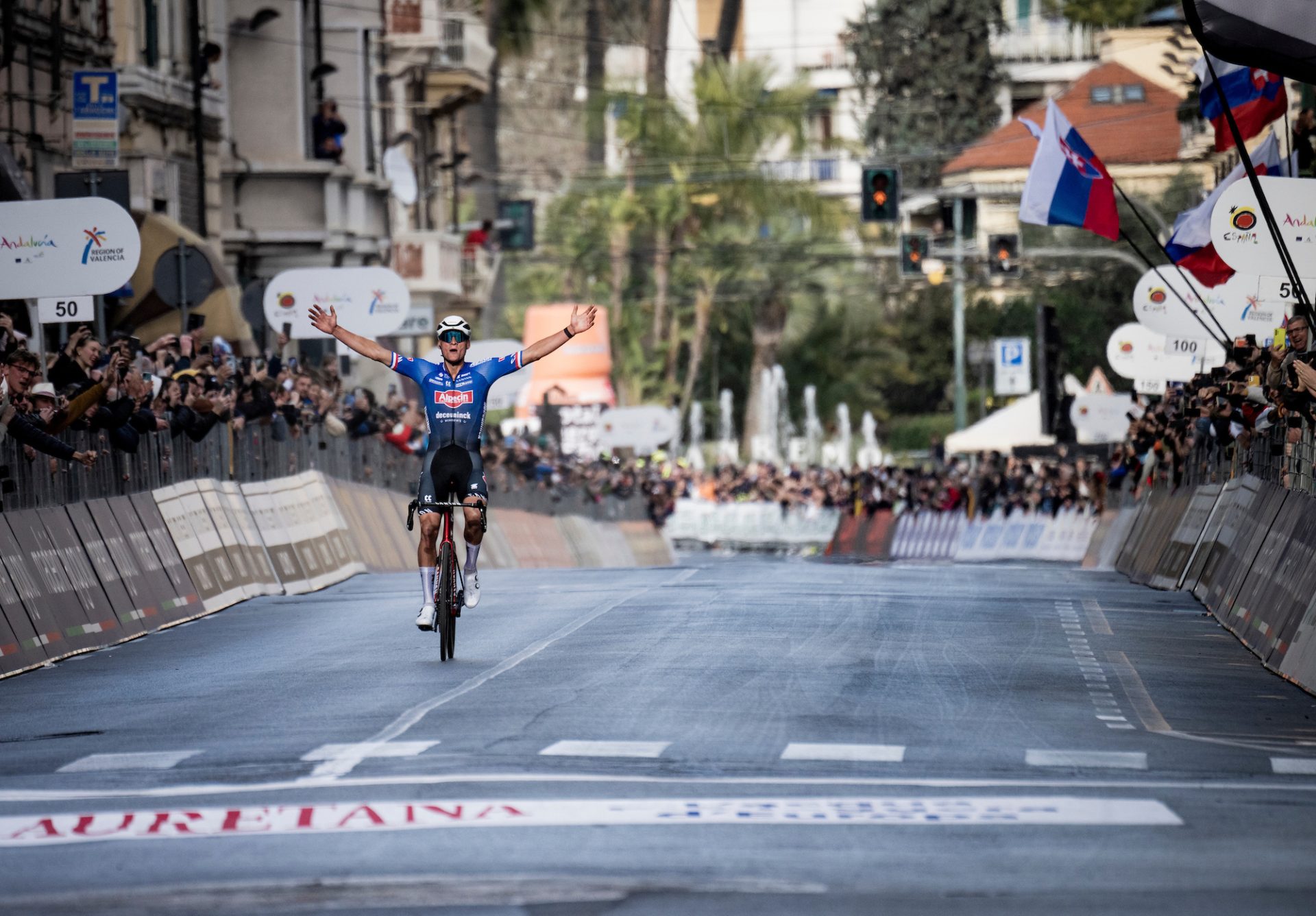
This season, in cyclocross, Van der Poel’s dominance has led us to the point of distraction: debating whether it’s good for the sport; discussing his behavior at Hulst; and digressions like, “Is his form now so good he’s jeopardizing his spring road campaign?”
On spitting at fans at Hulst: Van der Poel indefensibly lost his cool but, based on reports of said fans’ own behavior, that was a situation – much like the hotel incident at 2022 Worlds – that never should have been allowed to develop. Cyclocross promoters have long known about the propensity for fans marinating in beer all day to cross the line, and it speaks poorly of a World Cup that Flanders Classics’ security staff apparently was asleep on the job.
As for whether Van der Poel is going so deep now it puts his 2024 road season at risk, that’s an ideal barstool debate for winter because it’s unfalsifiable; by the time April rolls around everyone will have forgotten about it. The warning I’ve seen to Van der Poel that a similar fate befell Van Aert last year is mostly belied by the fact that Van Aert had a gap on the Carrefour at Paris-Roubaix and came undone due to a flat tire, not bad form; he gifted Gent-Wevelgem to a teammate; and at Flanders not even Van der Poel could stay with Tadej Pogačar. Van Aert’s worst finish in a one-day race last spring was fourth. The man didn’t exactly fall apart.
Let’s say, for purposes of argument, that Van der Poel has an underwhelming – by fans’ expectation – spring campaign. So what? Can we trust that Van der Poel knows himself well enough by now that he’s not blindly overcooking himself trying to get within one rainbow jersey of De Vlaeminck’s record? That he has a trustworthy, expert team to help him arrive in shape for whatever are his road goals this season: Flanders/Roubaix or perhaps a run at Liège-Bastogne-Liège for the fourth Monument Infinity Stone, or whether both take a backseat to Olympic gold?
I guess what I’m saying is this: I understand all the talk, but personally I’m leaving it behind: the debates about whether he makes cyclocross boring; pearl-clutching over his behavior at Hulst; the armchair-coach warnings about periodization and peaks.
In time, no doubt, Van der Poel will be dethroned, almost certainly by some young talent – an Albert Philipsen, say – who takes the lessons of Van der Poel’s dominance and raises them to yet another level. But right now, when I watch the Flying Dutchman pull clear of the pack a lap or two into a cyclocross race and leave the sport’s best in his vapor trail, I’m reminded of a scene from the second Matrix film, where Neo fights off three agents before blasting off into the sky. When a baffled Morpheus asks Link where Neo is, Link says, “He’s off doing his Superman thing,” as the camera cuts to Neo flying through the clouds. Mathieu van der Poel is one of a kind. Let’s just watch.
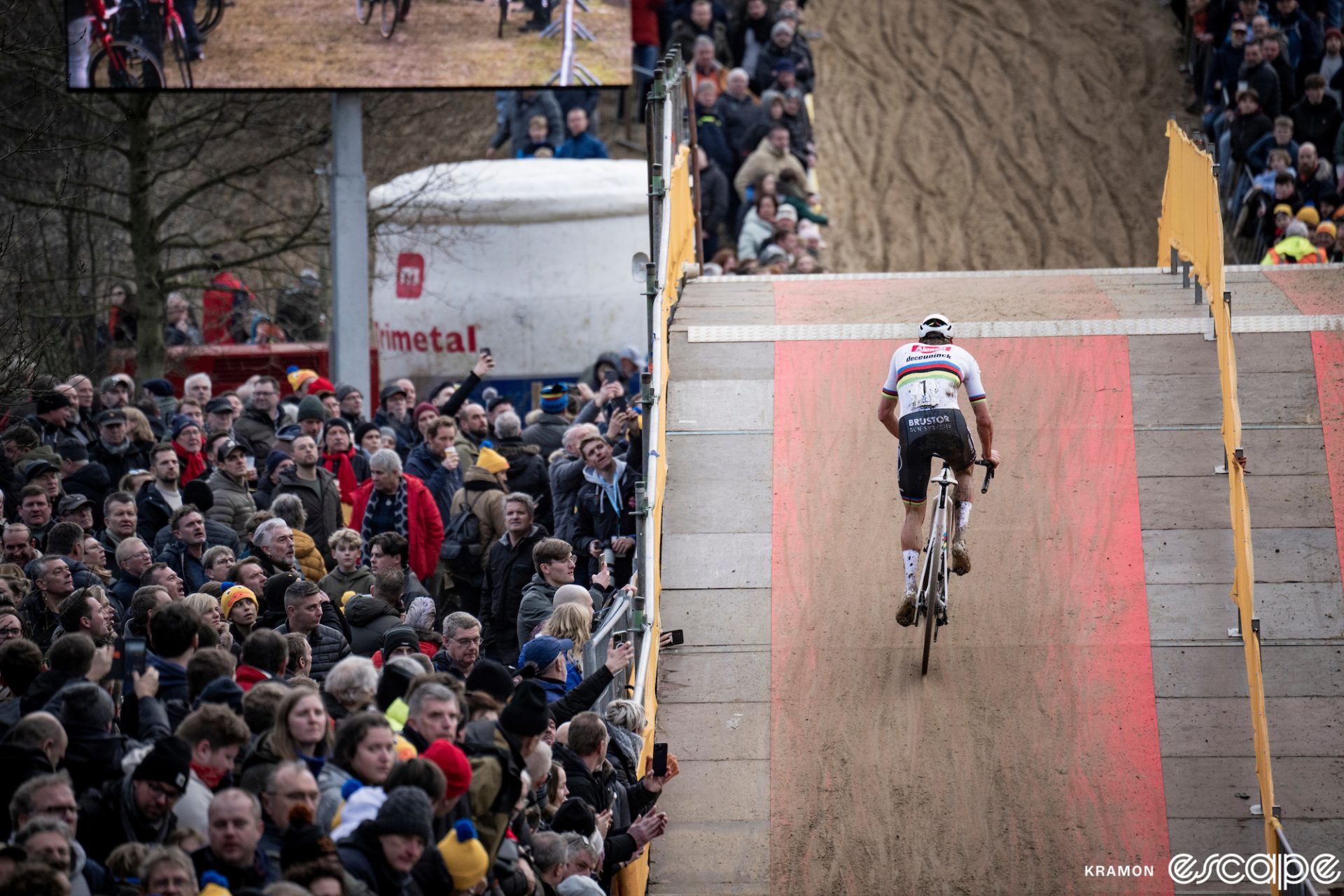
What did you think of this story?
